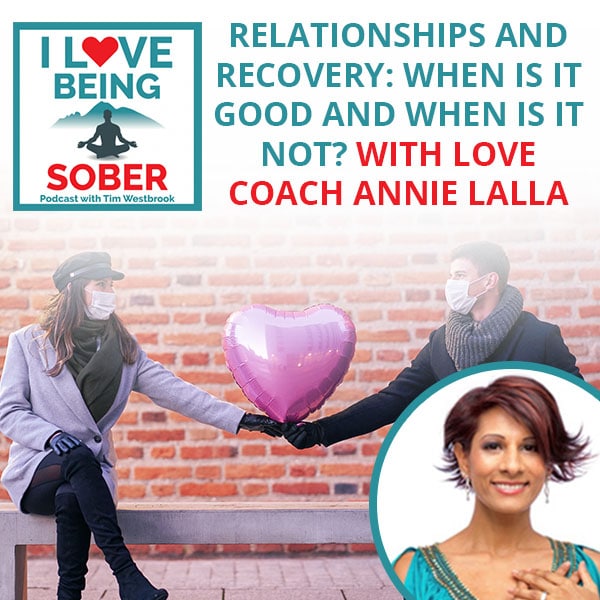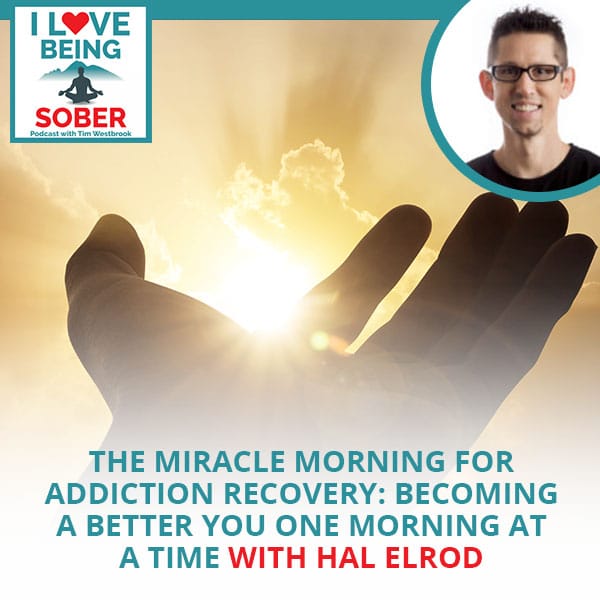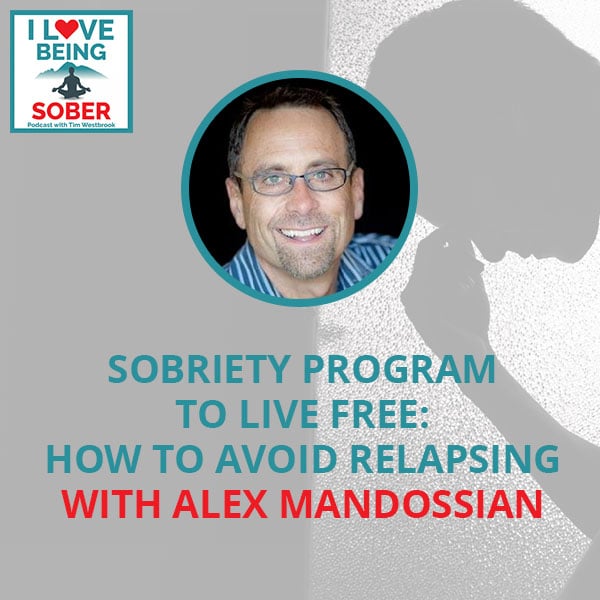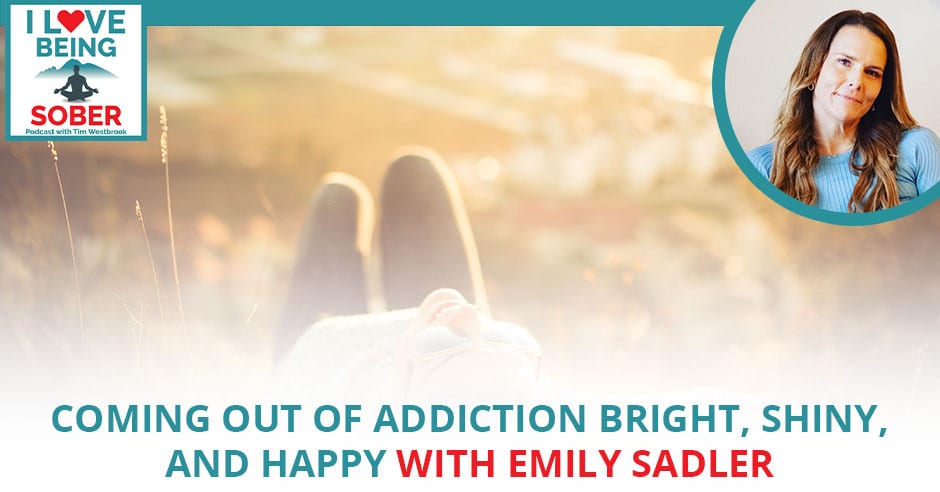
We often hear the term “leap of faith.” While that may be true for some situations, it’s actually more of a push than a leap in most. For Emily Sadler, it was a push of faith. Emily is the Founder of the staffing service company called ETC. by Emily. Prior to ETC.’s success, she was battling an alcohol addiction, which started when she was a teenager. On today’s show, Emily opens up to Tim Westbrook about her alcohol addiction and how she came out of it bright, shiny, and happy. They also tackle the importance of having a job or some purpose early in a person’s recovery, which is what she’s doing through ETC., extending a helping hand by employing people in recovery.
—
Watch the episode here:
Listen to the podcast here:
[fusebox_track_player url=”https://traffic.libsyn.com/secure/ilovebeingsober/ILBS_11_Emily_Sadler.mp3″ title=”Coming Out Of Addiction Bright, Shiny, And Happy With Emily Sadler” social_linkedin=”true” social_pinterest=”true” social_email=”true” ]Coming Out Of Addiction Bright, Shiny, And Happy With Emily Sadler
I’m here with Emily Sadler of ETC. by Emily. She loves being sober as well. I’m sure she’s going to share that with you. Emily and I go way back. I remember when I first got sober, Emily, you were 2 or 3 years sober. We used to go to the Prince of Peace 3 or 4 days a week. You sat at the same table with the same women every single day. I sat at the same table, and it’s been amazing to see where you were to where you are now. You started ETC. by Emily. The title of this show is From Addiction to Bright, Shiny and Happy, which the slogan of ETC. by Emily includes, “Bright, Shiny, Happy People,” which is awesome. I can’t wait to talk about that and how your life has transformed. Emily, welcome to the show. Thank you for being here.
Thanks for having me. I’m excited to be here. I’ve seen your company grow and expand. One of the neatest parts of recovery is watching people come in wrecked, and then over the years get better, shinier, happier, and build a life for themselves. I get to see that on the ETC team all the time. People come in not okay and then a year later, they’re enrolled in school.
They are married, kids and buying houses. We’re both similar in the sense that we get to work with people that are early on in recovery. They just got sober, wrecked and down at their bottom. They’ve got a long way to go, which can be discouraging. You probably were there when I got my 30-day, 60-day and 90-day chip because you were already 2 or 3 years sober. The business that I’m in is the same thing. We see people that are completely wrecked. First, I’d like to talk a little bit about your story. Where did you grow up, Emily?
I grew up in Seattle, Washington. I moved to Arizona many years ago. My alcoholism was alive when I was a teenager. It didn’t just take on me. I was that kid with pure potential but running them up all the time.
You started drinking when you were young, like how old?
13 or 14.
When did you know it was a problem?
I knew I was a problem early on. I was a little girl who’s super irritable, restless and discontent. Now I know that that irritable, restless and discontent little girl was a sensitive young lady who loved people to agree that I was uncomfortable. Like normal parents, they didn’t know that this little girl loves people and it’s uncomfortable. She literally cannot stand living in her own skin because she worries about people. It was a lovely thing, but without guidance. Most of the generation of children coming in aren’t taught to sweep their emotions under the carpet, shove them down and not speak about them. They’re taught to process their emotions and feelings. I don’t think that our age group was taught that. We were walking around with stuffed down emotions like, “Who’s not going to get shit?” People are going to do something to take away those feelings. I always knew it, then I put alcohol in my body and I triggered a family disease that has been long been around since the beginning of time in my family.
[bctt tweet=”When you’re in recovery, you don’t screw people over.” via=”no”]What I’m hearing you say is that the drinking was the solution to all the feelings that you didn’t want to deal with. The easier softer way is to have a drink. Alcohol is your drug of choice, anything else?
I’ve had a blog and talks about recovery at a public level. I always promised myself that I would never get on a stage or a podcast or a television show and not tell the truth about recovery. I love the name of your show, which is I Love Being Sober, and I do. I’m also never going to bullshit anybody. It’s no joke if you’re honest. I never want to be the old-timer who’s like, “I got sober, look at my life now.” No, I got sober, I worked my ass off. I still struggle, I still feel it and I still grow. Any other things like I did my fair share of drugs. In recovery, I still find myself picking up things to take away my feelings and emotions like sugar or shopping.
Sitting still and leaning into the pain and growing through it, though I do it because I know that it’s what I need to do to stay sober, I’m still a human being that isn’t like, “Feelings, let’s cross it. Let’s eat the cookie and I’ll process it.” I just like to be honest. With the newcomers, the old-timers or people at that time, we still understand how they feel. It’s just not attached to wanting a drink or wanting a drug necessarily. It’s more like not wanting to feel our feelings. We have solutions because we have Twelve Steps, but I no longer attach my feelings and emotions to wanting a drink, but there’s still a part of me that’s like, “How can I?”
It’s the solution. The easier softer way is to pick up your phone and look at Facebook or Instagram, go shop on Amazon Prime, go shopping, eat ten cookies, go exercise for three hours. These are all ways that we can take our minds away from the feelings, issues and things that we have to deal with. There are lots of ways to address and work through those feelings, but we have to work through them eventually.
I know that it sounds like I’m not willing to sit in discomfort as long as I was in the beginning or even in my first ten years in recovery. I’d sit in the mud for a while before I pick up the phone or work a step or phone a friend. I’d sit in it for a while. Now, that doesn’t work for me anymore like jumping into the solution way sooner than I used to. It’s the same recipe. The recipe for my recovery hasn’t changed. It’s the same thing. When I’m in the mud, it’s because I’m trying to control something like the Twelve Steps said.
“I want to be in control. I want things to happen the way that I want them to happen. I know that acceptance is the answer to all my problems.” It’s like if I’m trying to control this election, all I’m going to do is create anxiety, fear, restlessness and irritability.
It gives me reference in my eating because I can’t eat sugar enough. There’s no like, “Maybe I can have one.” I’m trying to control my feelings by eating one, and the delusion that I can then control it is the same exact thing. I’ll do it with other things.
Why did you decide to get sober? What happened?
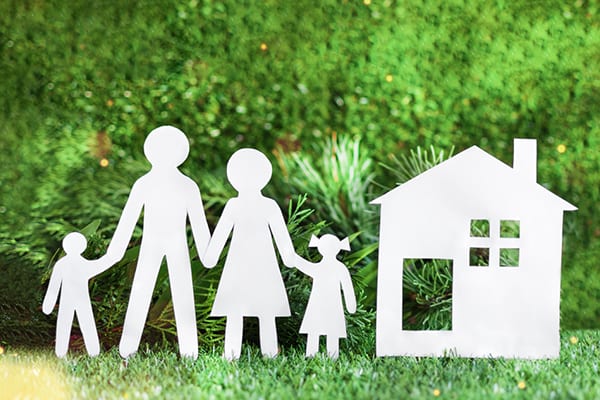
Coming Out Of Addiction: The neatest part of recovery is watching people come in wrecked and then over the years get better, shinier, and happier and build a life for themselves.
I have two sons but at the time, they were younger. Being a good mom was important to me. I know that it’s important to most parents. My alcoholism was starting to affect that part of my life. My kids are the most important thing to me, but alcohol was winning. They were not coming first. I knew that it was getting that. Some things started happening. I got institutionalized, not rehab because I was losing my mind. Alcoholic insanity and dizzy tremors and all that. I knew nothing about alcoholism besides my family has a history of it. I knew nothing about the Twelve Steps, I just knew I was losing my mind.
I got out of that and I got a DUI one night. I already got the first DUI and my thought process was, “If you get another one, you’re going to lose your kids.” I don’t know if that was true or not, but I know that that was the moment that God could speak to me clear enough to be like, “This party is over. You’re done. You’re going to drive drunk again.” I did. I got a DUI and I drove drunk again. The denial was off the table for me. I knew that if I didn’t stop that I was going to keep ongoing and it’s going to hurt my kids.
The father of your two boys, were you married? Were you not married? What happened there?
He lived down the street. We were divorced. We had joint custody in all of the boys’ life and he stepped in during that time. Luckily, he wasn’t that guy who was vengeful, nor did he want full custody of our kids. He didn’t go after me because normally, women lose their kids. He had every right to throw a CPS case on my lap and it would have killed me. When women come into the program and they’ve lost their children, I say, “I can’t even imagine. I love you. Let’s stay sober and get through this,” I mean that. I feel their pain. By the grace of God, he did not do that to me, but it could have happened.
Did you lose that relationship because of your alcoholism?
Maybe some of it. Bad alcoholism didn’t take off until after I got divorced. I was born irritable, restless, discontent and with zero coping skills. That’s not great in a marriage. As much as he’s a wonderful man, he was not my match. We would have ended up getting divorced anyway, but it didn’t help.
You talked about the DUI. Did you try to get sober a couple of times or was it one time you knew that you had to pull it together if you wanted to keep your kids?
I didn’t know what sober meant. I didn’t know very much about alcoholism. I knew nothing about Alcoholics Anonymous. As much trouble as I had been in, I’d never been in a meeting about Alcoholics Anonymous. That moment clicked and I figured out, “I’m going to drive drunk again and it’s not acceptable to me.” You’ve heard my story where I walked down the street and there was an old-timer on my street. I knocked on her door and I was like, “I need help.” She listened to me and there was no babying or any of that. She said, “I’ll pick you up in the morning. If you’re ready to get sober, I’ll show you how to do it.” She took me to AA and she sat me next to her for a year.
[bctt tweet=”Sometimes God will shove you off a mountain, and you’re going to get some wings on the way down.” via=”no”]I did the deal. I know that’s not everybody’s story, but that’s why when I speak, I don’t have any right to come to talk about recovery on any pedestal or soapbox. I came in wrecked, I got hand-walked into Alcoholics Anonymous by an old-timer. She sat me next to her and she loved me through the process. I know that my job in life now is to do the same thing for whoever. That’s what ETC. is. It looks like a staffing agency, but people come in and they can’t imagine getting their lives back or their kids back or take the monitor off their ankle to be able to say, “I’m going to give you a job and love you. This team will be there for you. If you need a ride, ask.” People need to flip and break, and some love. Because I got so much of that, I’m able to get it back.
Were you living in Phoenix when you got sober?
Yes.
How long after you got sober did you start ETC. By Emily?
Six years.
Tell me why did you start ETC. By Emily? I want to know this story.
Let’s go back a little bit. Because I was running amuck when I was younger, I didn’t do things like graduate from high school or learn how to communicate. I didn’t have a lot going for me like that person that’s like, “She’s a good mom.” Up until my drinking took me out of that, I was a good mom. It was enough for me. Being the PTO, I loved it. My earning potential wasn’t great and my alcoholism made it that I had done some damage to my brain. When we come in, we’re like smushy brains. I couldn’t do things like run a cash register, and remember how to make coffee drinks at the coffee shop I worked at. It was not looking good for me.
I used to tell a story where I remember my sponsor is being like, “It’s going to take a miracle for you to be self-supporting.” I was like, “That is rude.” Now she’s like, “Look at you.” I wasn’t employable. I was broken to the core. I went to a meeting in the morning, took a nap, went to Prince of Peace in the afternoon. I was a little broken baby. I got an opportunity to be a cater. I did that and I liked it and I got back on my feet, and I made some connections. When you’re in recovery, you don’t screw people over. That company went bankrupt, so then I found myself like, “I don’t have a job. I’m back in a situation where I can’t. Here we go again.”

Coming Out Of Addiction: When you’re starting a new business, be willing for it to become what it’s meant to become, but don’t throw in the towel.
I did what we do, which is go back to the basics like, “Go back to your recovery, call your sponsor, go to meetings, help other people, don’t so much worry about the job part, just stay sober.” I did that. ETC. was a drunken conversation on a patio years before. I couldn’t find a job, and I know that when you can’t find something, I try not to knock doors down so I paused. I made a little card on Prince of Peace that said ETC. by Emily. I was like, “I was going to run errands.” I did that for a minute. A company was like, “Do you have 2 or 3 people?” Even your companies use us for concierge services. For a while, it was that. We figured out that every business needs some help, needs some staff. It’s not time for them to bring on a full-time person. We did a lot of that in the beginning. Lexi did a spin-off company called Virtual by Lexi. She does that, and ETC. went on to staff events. We went from 1 person to 3 people, to 50 people, to 900 in the database within 6, 7 years old. We already have done recovery.
You talk about the push of faith versus the leap of faith. What does that mean?
I wouldn’t say that it took a lot of bravery to do what I did. No doors were opening. I knew that was God being like, “We’re going to shove you off this mountain and you’re going to get some wings on the way down.” That sounds like I had some courage, no, “You have to understand that you’ve got some things to do. I’m going to shove you off this mountain. You’re going to learn that you can do it.” Staying out of the outcome was a big thing that made ETC. what it is now. I was the girl with nothing to lose. It made me powerful person. I don’t have anything to lose because I don’t have an attachment to the outcome, as long as it’s helping other people. I have a plan for it, but now we have a team in Rural, Wisconsin on a military base. I certainly didn’t plan that. Stay out of the outcome.
It’s like burning the bridge. That’s the same thing for you. You had to make it work. There’s something to be said about that when someone’s in that predicament where they have to make it. There’s a lot of pressure. You had two boys to take care of. You didn’t have a job. To your point, your education was lacking. You had to figure it out and you did.
As you know, I have an entrepreneurial friend. He started a business and he’s kicking ass. In the beginning, it’s super overwhelming because you’re growing and you don’t have help. The only way that you could ever fail is by giving up. Keep going when you’re starting a new business. Be willing for it to become what it’s meant to become. Don’t throw in the towel because it’s hard. Starting a business is no joke.
With the pandemic, that was a perfect example. What are we going to do differently? What do we need to clean up? How can we continue moving forward, continue providing service, and helping people because we’re both in the business of helping people?
Mine came to a dead halt. I’m in the event industry. There are no events over 50. We lost our spring season. We’ve always been fine, bills have always gotten paid. It is why we’re in a truck stop in Rural, Wisconsin. I came in and I was like, “All right.”
You turn it over. Why would you say that your company grew? You said you have over 900 people on your roster now, and it’s been even higher than that.
[bctt tweet=”The only way that you could ever fail is by giving up.” via=”no”]We have 300 active in the city. It’s what we could handle.
You’re in Las Vegas, Phoenix, Wisconsin.
That’s it right now.
I have my opinion on this and I’m sure you have your opinion on this. What is the importance of a person early in recovery having a job or some other purpose? Even if they have family that can take care of them financially, is it important for a person to have a job or some purpose while they’re early in recovery?
Yes. Not everybody on ETC. team, but myself and a lot of people on ETC. team are not doing well when they come in. There are people that are. Their career is solid and doing okay. That’s not the demographic of people that normally sit across the table at the coffee shop for me. In order to stay out of depression, that’s what I would say why that is important. Earning some money and you have some pocket money and some money to pay for your sober living is important. Because it’s easy to fall into a funk because there are many feelings and emotions, it’s too easy to fall into a depression. If you’re not up and about and doing things at least in some part of the day, I’ve seen people go too far down. That’s why I feel that it’s important. In a sense of accomplishment like sobriety is an accomplishment. At the beginning, it’s like you’ve got 24 hours, strong work, don’t take a nap. I know that our theories on that are different and that’s okay. I’m a big fan of, “Go to a meeting, take a nap and do a little work.”
You don’t have to go out and get a new career necessarily. I’ve seen this before where people are like, “I need to go. That job’s not good enough for me. I know I can’t string together the 30 days, but I’m highly intelligent, I’m educated. I’ve made a ton of money before. This job is not good enough for me.” I’ve seen that and you probably have seen it. It’s like, “No, you just need a job.”
Also to be humble. People come across the ETC. line and I’m like, “I think they might be here to learn and to wash a dish.” That’s okay. Your point at the beginning of recovery is to not die. If you’re shooting for something bigger, that’s awesome. Let’s stabilize and stay alive long enough for cool stuff to happen. I’m always like, “Easy does it, chill. It takes a minute.”
I have my experience with that. I drove for Uber. It was the best thing I ever did. I drove for Uber while I started Camelback Recovery. I was going to school, getting my Master’s, doing admissions, I was the house manager, and I was driving for Uber. Driving for Uber was the best thing ever because you don’t have to think very much. You’re just driving around with people.

Coming Out Of Addiction: That lonely, shattered feeling gets better, but we have to hold on long enough for God to get in there and heal it.
It’s a good example of why we stay sober sometimes, when we run across people who aren’t. When I run across people that are intoxicated, I’m like, “Damn.”
“It’s unattractive, unappealing, not desirable. I’m glad that’s not me.” Tell me about your Wednesday coffee shop meetings. How did that come about? Why did you start doing the coffee shop meetings?
Magic happens at the coffee shop. It’s why I stay in this even on days it’s frustrating and I don’t make any money. It’s because I get to see direct connections come in where had that not happened that day and we had not met at that moment, that person wouldn’t be changing the world. The random goal there always happens on Wednesdays. We decided to meet in a coffee shop because we needed to meet the team in person. I would say 90% of the ETC. team hasn’t met me. We do that because I love them, I care about them, and I want to know them. No matter how big we get into, I want to make sure that their hair is not purple. There are a few reasons why like, “I want to see your eyes. I want to see that you’re okay.”
A lot of times the team, even if they didn’t have a relapse, I can tell something is wrong with them. If I can pull them aside and talk about it, even if it’s for five minutes and they know that they are cared about, it gives us all an opportunity to see each other and love each other. It’s also where they get paid, which gives everybody the motivation to come to the coffee shop. We do interviews on the same day. Who needs an office? It is 2020. That’s the year coffee shop work. It’s fun. You should come in sometimes and say hi.
I’ll put it on my schedule. I’d love to come by. I’m sure a lot of magic happens at that coffee shop. We see some people that are early in recovery. There’s a lot that happens both for me and for the people that I’m sitting across from. Would you consider that service work?
I feel like my whole point of it being service work is I’m making money. Service work in the idea of the Twelve-Step programs, it’s absolutely not. With that being said, I am on this planet to be of service. I know everybody has their thing. I know between God and I, that is the only reason I’m here. That’s it, go be of service in whatever capacity. Service, but I also make money with it. The way that I balanced that out is the second that money comes before service, the party is over. I say it all the time. Our primary purpose is to help other people in ETC. If we get off balance with that, God usually pops me in line, but it’s unacceptable to me. Money cannot come first.
To your point, it’s helping other people. I think about that in my business as well. We’re here to help people. We’re also making money, but we’ve got to make decisions and do the next right thing.
If I don’t do the business part of my business, then there will be no work for me to cut the paychecks, to be of services of people. Sometimes when I have to make a business decision that is the best for the whole, I have to remind myself that. What makes ETC. a service is the love in the family and all that. The fact that I cut continual paychecks every Wednesday is also helpful. I still try to remember, I still have to tell myself to do business life stuff.
[bctt tweet=”It’s too easy to fall into depression if you’re not up and about doing things.” via=”no”]A successful business is happy customers, happy clients and you make a profit. You have to make money if you want to pay your employees and pay your bills and stay in business.
You probably know of something, but there should be a networking group and a support group for people in the recovery industry because it can get mucky. I’ve seen a lot of people lose their recovery because they put recovery work outside of the rooms before their recovery. It’s a fast way to relapse.
In working in the treatment industry, I see it all the time. I’ve had house managers that have said, “I’m of service all day long.” It’s like, “No, doing your job is not being of service. Doing your job is not working in a Twelve-Step program.” Working a Twelve-Step program means you have a sponsor, you’re working on the steps, you go into meetings. You have sponsees that you’re working with. You’re taking people through the steps. You’re doing twelve-step work. That doesn’t have anything to do with being a house manager or working in the industry. I see it all the time. You see people that are burned out like other treatment professionals, not even house managers. I’m talking about people that work at treatment centers and so forth, the burnout rate is high. People don’t take care of themselves.
A lot of times, I saw people from the executive team go to work in recovery. That’s the next step. ETC. is an on-call work. It’s not consistent. There’s no hours promise. You get work whether you say yes. When it’s time to get more consistent work for them, they go and do that. They sometimes work a little bit for ETC., and I see them coming and working overnights somewhere. I see them spinning, tired and I see them working too many hours. I can almost call it like, “Reel it back in.” That’s been a frustration for me.
We care and we see it happen. On one hand, everybody is on their own journey. God’s in control. I’m not in control. I’m going to do the next right thing. I’m going to be an example. I know you’re going to do the next right thing. You’re going to be a good example. It’s like, “I’m the rock. You’re the rock.”
Like I said in the beginning, it’s important that I don’t become sunlight, a shiny bright example of recovery because there are days I can’t get out of bad stuff. There are days I still suffer from the disease of alcoholism, I just know the solution now. In order for me to sit across the table for someone with an ankle monitor on who has lost their kids, who have felonies, who doesn’t imagine them getting their life back together, I have to remember what it was like. I have to share my stories and my current struggle. It’s important that people know that there are no heavy hitters in Alcoholics Anonymous for all this.
We’re all in this. We all have struggles. That’s part of being a human being, experiencing your feelings, and walking through your feelings. From addiction to bright, shiny and happy, what does that mean to you?
First of all, you saw me. It took about five years for me to even brighten up a little. I struggled at my first five years. A lot of that is when you get into recovery, even in the beginning of recovery for a lot of people, they start to stand up taller and get a little brighter, and be able to get up in the morning. You’ll hear them be like, “I’m doing things that I haven’t done in years.” What that means and I get that a lot from my clients. They’re like, “How do you find such amazing people?” I like, “They find each other.” They are bright, shiny and happy because they’ve gotten a second chance at life. As contract laborers go, which has this stereotypical like, “You use contract.” Mine are bright, shiny, happy, grateful, willing, have the tools of the program and that’s what it gives them. You would think that it would be the opposite, but it’s what keeps the ETC. team in front. It’s this willingness and gratitude. They’re decently healthy because they’re not partying at night. There’s a song, Shiny, Happy People. I don’t even remember. I preached the word and then took it.

Coming Out Of Addiction: The people that you get sober with will be in your life forever. Whether or not they slip and slide or go back out, they’re always going to have a huge place in your heart.
How did you come up with that slogan?
I heard someone sing the song. It’s not bright, shiny, happy people in the song. It’s something else but it’s good. It works for us.
It’s awesome to have a tagline. If someone wants to learn more about you or working for you or getting a job for you, how can they find you?
They can go to Coffee Plantation from 4:00 to 7:00 on Wednesdays. They can go to ETCbyEmily.com. Our website tells all about us and what we do. People can apply there. My phone number is on there or they can like my Facebook. The coffee shop is the fastest way. If someone’s like, “I want a job.” Going into the coffee shop is the best way to get on the roster. We are hiring. I expected that we’d have some work in the spring break. I would want to get there in the winter, but I did not expect to get crushed. We are as busy as we have been every other year if not more so, which is awesome.
What are you seeing as we’re headed into the fall? Normally, things pick up for you. You’re a little bit slower in the summer because we’re in Arizona. It’s hot in Arizona. People typically aren’t having lots of outside events in Arizona. Now, we’ve made it through the summer, we’re working our way through this pandemic. What does the future look like for ETC. by Emily?
We took a government contract in Wisconsin. We’re still providing service staff to the cafeteria on the base, which is a different scope of work than we normally do. It’s keeping people employed and making pretty good money. We have a 54-day event, which is a Christmas drive through. There’s one in Glendale and in Tempe. It’s like a big production. They do it every year, but my guess is it’s going to be huge in 2020 because families still need to do wonderful things but there’s COVID. I will put that information for that event on my Facebook page and on ETC. by Emily Facebook page so people can do that. We’re staffing that, which is steady work and it’s fun. We’re excited about that.
It creates culture.
The big events are on-hold like our Dallas for 500 people that use a lot of staff. Hopefully in Jackson it will happen. Hopefully, the open will happen.
[bctt tweet=”Your point at the beginning of recovery is to not die. If you’re shooting for something bigger, that’s awesome.” via=”no”]What are the events limited to right now or what are they opened up to right now?
I haven’t heard the capacity number in a while, but I keep on hearing the number of 50 and they’re in-houses. It’s shifted a little bit. Weddings that were 200 are now 50, and then Zooming people in from out of state.
What else would you like to share with the newcomer or the mom or the person that wants to find long-term recovery? What’s your advice?
I don’t know where everybody else feels their feelings, but mine are always right here. I remember at the beginning of recovery and still when I’m growing through something, I’m feeling like a shattered glass. I was shattered that I could hardly breathe. What I want to say to the newcomers is that I’ve promised that it goes away. I’ve promise that it gets better, and that lonely shattered feeling gets better, but we have to hold on long enough for God to get in there and heal it. I have a journal entry at nine months of sobriety that says, “Had I given up, I would have never known that this gets so much better.”
What do you think is the importance of the environment and/or the community, the people that you surround yourself with? For the person that’s early in recovery, what are the potential repercussions if they go back to their old environment and hang out with their old friends?
I am a big fan of submerging yourself into the rooms of recovery. The people that you get sober with will be in your life forever, whether or not they slip and slide or go back out, they’re still always going to have a huge place in your heart. That is important in the community. At ETC., that is a huge part of what we do and a huge part of why people come back and work for us year after year. People are lonely and looking for connection, whether or not they’re in and out of recovery. People need that. They need people that can identify with their pain. We cannot do this alone for sure. It gets lonely if you’re in a room of people. If you’re not around people, it doesn’t work. I think it’s one of the most important parts of recovery. Find your people and stay close to them.
It’s about developing a new community, new environment, especially early on in recovery. My experience and what I see is that people that go back to their old community and their old environment, end up going back to their old ways. It’s too easy.
It’s more than putting the drink down. When we come in, we’re twisted. Everything is everybody else’s fault. All of the things that steps help fix. You’re talking out loud and you’re processing through someone who is still out there and not in recovery, or will post on your bullshit, then the recovery process takes longer. If you’re around people that are recovering that are like, “Let’s look at it a different way. Maybe your mom’s not answering the phone because you stole money from her over the last five years.” It’s getting perspective on all of the things that you did.
“Maybe your wife doesn’t want to talk to you because you cheated on her multiple times.” They’re like, “I’m sober now.” It takes a minute.
That’s a big one too. The beginning of recovery is hard like, “I have 90 days, I don’t know what the problem is.” They’re not going to get over it in 90 days. All of that, being around people that will lovingly explain those things to you is important.
Emily, thank you so much. Everybody, thanks for reading. ETCByEmily.com is how you find Emily. Emily Sadler is her Facebook and Instagram or @ETCByEmily. Coffee Plantation every Wednesday from 4:00 to 7:00 PM. If you’d like to interview for a position with ETC. by Emily and if you’d like to get on her roster, as she said, we’re headed into the fall. Things are picking up. We’re getting through the pandemic. If you’d like to work around people in recovery, you like to get yourself plugged in, then look her up. Thank you for your time, Emily. I appreciate it.
Thank you. Bye.
Important Links:
- www.ETCByEmily.com
- Camelback Recovery
- ETC. by Emily Facebook page
- Emily Sadler Facebook
About Emily Sadler
 I started ETC. on a wing and a prayer. The truth is, after several years of working in hospitality and management, I couldn’t find a job and with two teenage boys to feed that was a huge problem. I often hear the term “leap of faith”. I actually think that in most situations it’s more of a push than a leap, and then if you are lucky you find out that you have wings. I am truly lucky, rather blessed, I have found my wings.
I started ETC. on a wing and a prayer. The truth is, after several years of working in hospitality and management, I couldn’t find a job and with two teenage boys to feed that was a huge problem. I often hear the term “leap of faith”. I actually think that in most situations it’s more of a push than a leap, and then if you are lucky you find out that you have wings. I am truly lucky, rather blessed, I have found my wings.
For the first year it truly was ETC. by Emily. I was a soloprenuer wearing all the hats, working crazy hours and just trying to get by. My hard work brought more business, along with opportunity, and so I grew; becoming ETC. by Emily and Haley and then ETC. by Emily, Haley and Lexi and then…you get my point. What I found is that the number one thing that businesses need to grow is people. Good people. You can be the best at something but one person alone can only do so much.
Without good help businesses are at a standstill at best. What the ETC. team does is take people’s lives and businesses to the next level by providing them Bright, Shiny (Brilliant), Happy People! My passion, my gift is being able to connect passionate business owners with Bright, Shiny, Happy People and in doing so everyone wins. My clients are both my ETC. clients and my ETC. team. We all have dreams and my wish is to make everyone’s come true!
– Emily Sadler, Founder of ETC. by Emily
